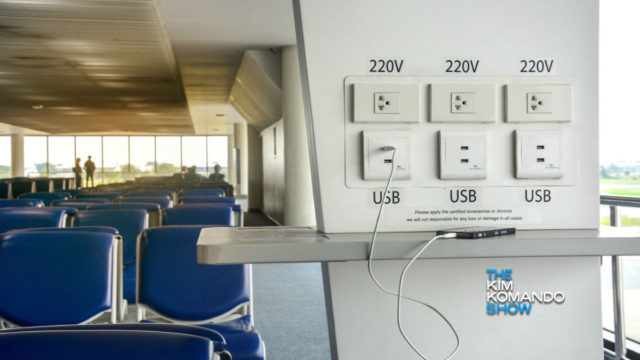Wait, are public phone chargers dangerous?

Those charging kiosks in airports, hotels and malls are so tempting when you’re out and about with a dying phone. Their owners promise they’re safe. The government disagrees, and so do I. Groan, I know.
Welcome to the newest phase of juice jacking. The phenomenon has been around for more than 10 years. Hackers use public phone-charging stations to upload malware to your devices. Then, they ransom your device or steal your passwords. Super-duper.
Have no fear. When your batteries hit the low, low point, just follow these Koman-do’s and don’ts (never gets old).
Don’t use public USBs – just outlets
Good news: Actual cases of juice jacking are rare in the U.S. They happen through USB connections, so if a kiosk has actual power outlets to charge your phone using your own adapter, you’re good to go.
Stay away from USB ports of any size, though, especially when traveling overseas. USB standards are international, and foreign hackers can target USB ports in hotels or rentals to steal your data, even if you’re not using a kiosk.
Do go cable-free
Use wireless charging pads instead of USBs when possible. More and more public kiosks have them. This method doesn’t exchange data directly with your phone, so it’s virus-free by default. Score.
Don’t use a data cable
If you’re desperate for juice, you can use a USB connection safely … with the right cable. Pack a charge-only cable for your trip. They’re cheap and compact, and they don’t allow for data transfers.
Don’t choose the ‘trust’ option
Newer phones are smart enough to be wary of an unknown USB connection. (Some humans could learn a thing or two, huh?). Plug in and you’ll get a prompt to “trust this device” or “share data.”
Always say “No” to these options when you’re away from home. Both allow data communication between your phone and the charging hardware, which may be infected with malware. Choose the “charge-only” option. If that’s not available, keep walkin’.
Do carry an external battery
They’re slim and durable, and you’ll never regret packing them. Drop your external battery into a suitcase side pocket or laptop bag and keep it close. Just remember to charge it back up after you use it so you’re always good to go.
🪫 Did you hear about the robot caught trying to rob a bank? Its battery died halfway to the getaway car. Police have no plans to charge the suspect. (You laughed, I know it!)
Don’t get left tech-behind – Stay tech-ahead
Award-winning host Kim Komando is your secret weapon for navigating tech.
- National radio show: Find your local station or listen to the podcast.
- Daily newsletter: Join over 650,000 people who read The Current (free!).
- Watch: On Kim’s YouTube channel.
- Podcast: “Kim Komando Today” — Listen wherever you get podcasts.
We may earn a commission from purchases, but our recommendations are always objective.
Tags: battery/batteries, devices, family, hackers, malware, Target